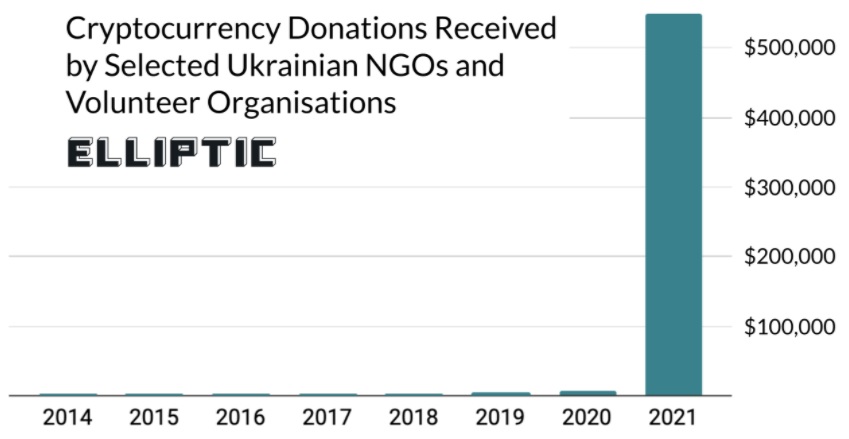Non-government and volunteer organizations collecting funds to support Ukrainian forces have been accepting donations in cryptocurrency, a new report has unveiled. The findings have been published amid heightened tensions with Russia, which has been accused of amassing troops at the border with Ukraine.
Ukrainian Organizations Crowdfund Defense Effort With Crypto
Ukrainian NGOs and volunteer groups have raised several hundred thousand dollars in cryptocurrency, a study by blockchain analytics firm Elliptic has revealed. Donations made in digital assets have increased by 900% last year, the company’s researchers found.
Most of these groups were founded during the Maidan revolution in 2014 when they helped protesters. Since the annexation of Crimea by Russia, they have been supporting Ukraine’s war effort against pro-Russian forces in the eastern Donbas region by sending volunteers, weapons, and supplies.
In the past few years, the organizations have received millions of dollars in fiat money through bank wires and payment apps. Meanwhile, bitcoin has become an alternative funding channel as it allows donors to circumvent restrictions imposed by the traditional financial system, the authors note.
Elliptic has identified several crypto wallets used by the non-government organizations and volunteer groups and found they have received over $570,000 worth of digital coins in total. Most of the funds were transferred over the course of the past year.

Among the groups accepting cryptocurrency is Come Back Alive, which supplies the Ukrainian army with military equipment, medical products, and provides training. It introduced the crypto option in 2018. The organization has received almost $200,000 in digital currency during the second half of 2021.
Ukrainian Cyber Alliance, whose members have been engaged in cyberattacks on Russian targets since 2016, including against Russia’s defense ministry, takes only crypto donations. In the past year, it received close to $100,000 in BTC, LTC, ETH, and various stablecoins.
The Belarus-based Cyber Partisans is another hacktivist collective accepting exclusively bitcoin. It took responsibility for a cyberattack on the Belarusian railroad’s systems, demanding the withdrawal of Russian troops from the country. According to the report, it raised $84,000 in BTC in the past six months.
Myrotvorets Center is an NGO headquartered in the Ukrainian capital that reveals information about persons working for Russia, from mercenaries to journalists. Since enabling crypto donations, after the closing of its Paypal account, it has accumulated at least $268,000 in BTC.
While these organizations are often funded by private donors, some of them are believed to maintain close ties with the government in Kyiv. Thus, Ukraine joins other nations that have employed cryptocurrency to raise funds, Elliptic remarks.
The report mentions Iran — which has been using bitcoin mining to monetize its energy reserves and crypto payments to bypass foreign sanctions — as well as North Korea, allegedly implicated in stealing digital coins to finance its weapons programs.
The report notes that Russia has in fact used crypto for fundraising since the beginning of the conflict. A series of online campaigns which raised money for the pro-Russian separatists in Eastern Ukraine accepted cryptocurrency alongside fiat. One of them, conducted under the banner “Save the Donbass,” registered at least 68 bitcoin donations between 2014 and 2016.
Tags in this story
Bitcoin, conflict, Crypto, Crypto Donations, Cryptocurrencies, Cryptocurrency, donations, Donbas, donors, Eastern Ukraine, NGO, ngos, non-government, Russia, russian, Ukraine, ukrainian, volunteer groups, volunteers, War
Do you expect crypto donations for Ukrainian volunteer groups to continue to increase? Tell us in the comments section below.
![]()
Lubomir Tassev
Image Credits: Shutterstock, Pixabay, Wiki Commons
Disclaimer: This article is for informational purposes only. It is not a direct offer or solicitation of an offer to buy or sell, or a recommendation or endorsement of any products, services, or companies. Bitcoin.com does not provide investment, tax, legal, or accounting advice. Neither the company nor the author is responsible, directly or indirectly, for any damage or loss caused or alleged to be caused by or in connection with the use of or reliance on any content, goods or services mentioned in this article.



